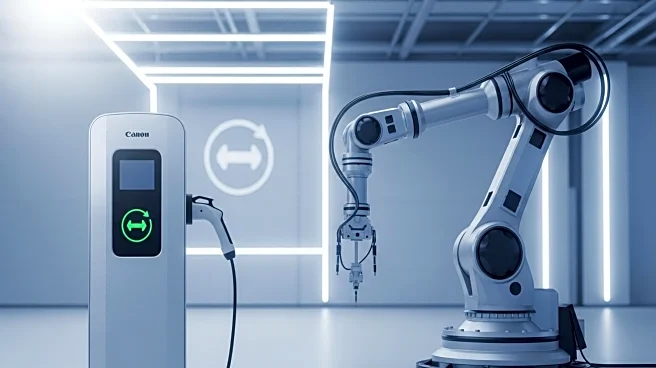What's Happening?
Toyota has made significant changes to its supply chain to support local electric vehicle (EV) production in Thailand. The company is increasing the use of locally sourced components, particularly from Chinese suppliers, for batteries and electric motors in Thai-manufactured vehicles. This adaptation reflects Toyota's strategic acceptance of Chinese technological capabilities while maintaining its manufacturing presence in Thailand. The move is part of a broader strategy to accelerate electrification initiatives across multiple vehicle segments, including the potential mass production of the Hilux battery-electric vehicle (BEV) by 2025. The Hilux, Thailand's best-selling pickup truck, is undergoing public transport trials in Pattaya, demonstrating Toyota's commitment to practical EV deployment.
Why It's Important?
Toyota's strategic shift in supply chain management is crucial for the local EV industry in Thailand, as it supports the country's goal of becoming a key driver of EV adoption in Southeast Asia. By leveraging Chinese technological capabilities, Toyota can enhance its competitive edge against Chinese EV manufacturers. This move also aligns with Thailand's '30@30' strategy, which aims to achieve 30% zero-emission vehicle production by 2030. The increased local production of EV components can stimulate economic growth, create jobs, and support environmental sustainability objectives. Additionally, Toyota's multi-pathway strategy, encompassing hybrid, battery-electric, and hydrogen fuel cell technologies, allows the company to address diverse market segments and government policy requirements simultaneously.
What's Next?
Toyota's preparation for mass production of the Hilux BEV and the expansion of hybrid options within its compact vehicle segment indicate a continued focus on electrification. The company's strategic supply chain modifications may lead to further collaborations with Chinese suppliers, enhancing technological capabilities and production efficiency. As Thailand implements its '30@30' strategy, Toyota's actions could influence other manufacturers to adopt similar approaches, potentially leading to increased local production and investment in the EV sector. The development of battery swapping infrastructure, although currently limited, may expand as market growth continues, supporting the broader adoption of EVs in Thailand.
Beyond the Headlines
Toyota's strategic acceptance of Chinese technological capabilities highlights the growing influence of Chinese suppliers in the global EV market. This shift may have long-term implications for international trade relations and technological collaboration between Japan and China. Additionally, the focus on local production and supply chain modifications reflects a broader trend towards regionalization in manufacturing, which could impact global supply chain dynamics. The electrification of the Hilux, a popular pickup truck, signifies a cultural shift in consumer preferences towards sustainable transportation solutions, potentially influencing other markets in Southeast Asia.










